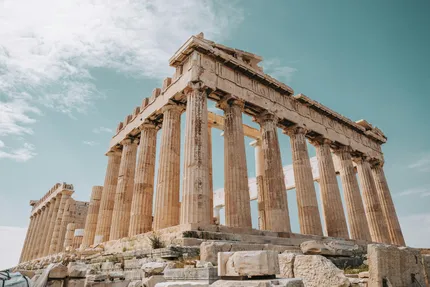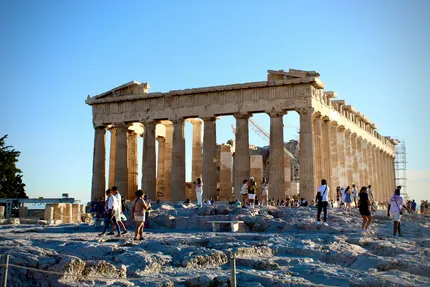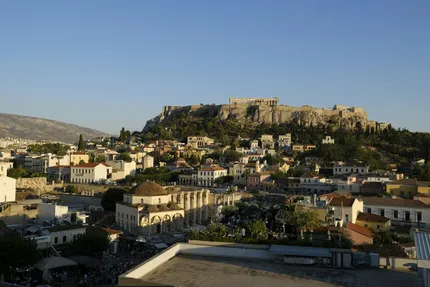CityTouring

City trip to Athens
GreeceAthens, the vibrant capital of Greece, is a city where ancient history and modern life seamlessly blend. With its world-renowned landmarks like the Parthenon and the Acropolis, this city is a haven for history enthusiasts and culture seekers. As you stroll through the bustling streets of Plaka or the sophisticated neighborhoods of Kolonaki, you'll encounter a rich mix of architecture, from classical antiquity to neoclassical and contemporary styles.
The city's lively nightlife, exquisite cuisine characterized by traditional Mediterranean flavors, and the warm hospitality of Athenians make it an irresistible destination. Athens is also a gateway to the stunning Greek islands, providing a perfect mix of history, scenery, and beach relaxation. Its exciting art scene, open-air cinemas, and vibrant street art add to the modern cultural vibe, making it a city that truly has something for everyone.

Acropolis of Athens
The Acropolis, Athens' crowning jewel, boasts the Parthenon, Propylaea, Erechtheion, and Temple of Athena Nike. Perched atop a rocky hill, this ancient citadel symbolizes classical Greek culture, offering breathtaking views and unparalleled insights into Greece's architectural and historical legacy.

Plaka
Plaka, Athens' oldest neighborhood, enchants with narrow cobblestone streets, neoclassical houses, and vibrant bougainvillea. Nestled beneath the Acropolis, it offers quaint cafes, local artisan shops, ancient ruins, and a timeless, picturesque ambiance blending history with lively Greek charm.

Ancient Agora
The Ancient Agora in Athens was the vibrant heart of classical Greece, serving as a marketplace and civic hub. It features historic ruins like the Stoa of Attalos and the Temple of Hephaestus, reflecting ancient democracy, culture, and daily life.
Athens is an ideal destination for history buffs, and those with an interest in ancient civilizations will find endless sites to explore. It's also perfect for food lovers eager to indulge in authentic Greek cuisine, whether that's fresh seafood or traditional dishes like moussaka and souvlaki. Art and culture enthusiasts will appreciate the city's diverse galleries, performance arts venues (Sometimes right within ancient sites), and music festivals. Shoppers can enjoy vibrant markets and chic boutiques.
For those seeking a lively social scene, Athens' vibrant nightlife offers numerous bars and clubs that keep the city buzzing late into the night. Families can enjoy informative museum visits and parks, while those seeking relaxation can unwind in the city's numerous cafes or take day trips to the nearby beaches of the Athenian Riviera. Athens is, without a doubt, best suited to those who appreciate a mix of history, culture, and a dynamic urban atmosphere.

Best time to visit Athens
The best time to visit Athens is during the spring (April to June) or autumn (September to October) when the weather is mild and pleasant, and the tourist crowds are lighter compared to the summer peak season where it also simply can get too hot to enjoy a visit.
More activities and things to see in Athens:
Acropolis Museum
The Acropolis Museum in Athens showcases Greece's ancient heritage, housing artifacts from the Acropolis, including the Parthenon sculptures. Its modern design, featuring glass floors and panoramic views, seamlessly blends history and architecture, offering a captivating journey through classical antiquity.
National Archaeological Museum
The National Archaeological Museum in Athens is Greece’s largest and most significant museum, housing an unparalleled collection of ancient artifacts. Spanning millennia, it showcases masterpieces from Greek prehistory to late antiquity, including sculptures, pottery, and the iconic Mask of Agamemnon.
Mount Lycabettus
Mount Lycabettus, Athens' highest hill, offers stunning panoramic views of the city and the Aegean Sea. Accessible by foot or funicular, it features a charming chapel, open-air theater, and a café, making it a popular tourist destination.
Syntagma Square
Syntagma Square, Athens' central hub, is a bustling plaza framed by neoclassical architecture. Known for the Greek Parliament building, it hosts the ceremonial Changing of the Guard and serves as a focal point for events and gatherings.
Temple of Olympian Zeus
The Temple of Olympian Zeus in Athens, once Greece's largest temple, showcases towering Corinthian columns and ancient grandeur. Dedicated to Zeus, its long construction spanned centuries, symbolizing the city's architectural ambition and devotion to the king of the gods.
Panathenaic Stadium
The Panathenaic Stadium, entirely made of marble, is an iconic symbol of Athens. Hosting the first modern Olympics in 1896, it stands as a historic arena for ancient athletic events, offering awe-inspiring architecture and a rich sporting legacy.
Monastiraki Flea Market
Monastiraki Flea Market, in the heart of Athens, is a bustling hub of vibrant shops and street vendors. It offers eclectic treasures, from antiques and souvenirs to handmade crafts and vintage goods, amid a lively, historic atmosphere full of charm.
Psyri Neighborhood
Psiri buzzes with life, blending traditional charm and modern flair. Its vibrant streets feature colorful street art, cozy tavernas serving authentic Greek dishes, trendy bars, artisan shops, and live music venues, making it Athens’ cultural and nightlife hotspot.
Getting around in Athens
Athens is a city where you can enjoy a variety of transportation options. The city's public transport network is well-developed and includes buses, trolleys, a metro system, and trams. The metro is particularly useful for reaching major sites and neighborhoods. Walking is another viable option in the more historic and central areas, such as Plaka and Monastiraki, which are both very pedestrian-friendly. For those venturing further afield, the city's well-marked taxi service is an option, though it might cost more than public transport. While driving isn't necessary thanks to the robust public transit options, having a car might be useful for day trips outside the city. Biking is not very popular in Athens due to limited cycling paths and heavy traffic. Overall, the best way to explore Athens, especially its historical areas, is by a combination of walking and public transport.
Getting to Athens
Getting to Athens is straightforward, with multiple international connections available. Athens International Airport, Eleftherios Venizelos, is the main gateway, offering flights from numerous European cities and major global hubs. From the airport, you can reach the city center by metro, suburban railway, or bus. If you're traveling by train, the international connections to and from Greece are limited compared to flights, but domestic trains from northern cities like Thessaloniki are available. Long-distance buses, operated by the KTEL network, serve various domestic routes and some neighboring countries, offering a scenic way to reach Athens. While the city isn't overwhelmingly accessible by international train routes, it remains a well-connected destination via air and also through its port in Piraeus for ferry connections to the Greek islands and beyond. With these diverse options, accessing Athens is convenient for travelers coming from a wide range of locations.